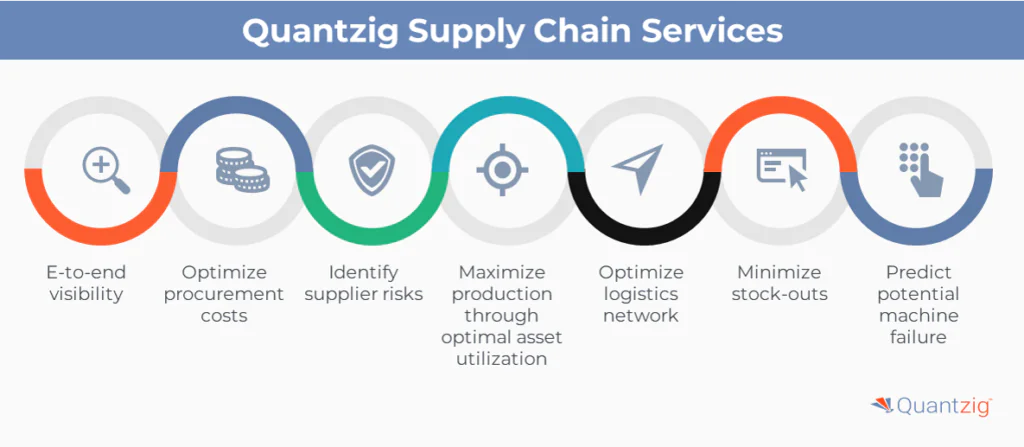Written By: Medha Banerjee
Meeting customer commitments while satisfying business requirements for cost-effectiveness, profitability, and sustainability presents a significant obstacle for enterprises worldwide, particularly amidst ongoing disruptions such as climate shifts, market fluctuations, trade uncertainties, political dynamics, and regulatory changes.
The Supply Chain Transformation at Quantzig assists you in harmonizing your business requirements with continuously escalating customer demands.
Request a free demoTable of Contents
Key Takeaways:
- Transforming supply chain management aligns operations for efficient customer service, cost reduction, and increased profitability.
- A well-managed supply chain ensures timely delivery, product availability, and quality assurance, enhancing customer loyalty.
- Effective SCM management reduces costs and prepares for disruptions, safeguarding business continuity.
- Streamlined supply chains provide insights for informed decisions, anticipating demand and fostering innovation.
Understanding Supply Chain Management (SCM)
Supply Chain Management is more than just ensuring products reaching the customers; it’s a strategic cornerstone for businesses. By optimizing the SCM, companies can reduce expenses and streamline production cycles. The objectives may vary across industries, but the ultimate goal is to align the supply chain with strategic objectives. This often involves Supply Chain Transformation, going beyond mere software upgrades to reshape processes, roles, and structures.
In the retail sector, where meeting consumer demands swiftly is paramount, SCM plays a pivotal role. Leveraging powerful new technologies and analytics, companies can fine-tune demand planning, optimize inventory levels, and minimize spoilage. Streamlined processes reduce reliance on manual work, enhancing efficiency and cutting costs.
Competing in the market requires staying ahead of trends and meeting consumer expectations, whether it’s availability, price, assortment, or speed of delivery. Fulfilment standards must align with consumer demands, and Supply Chain Management systems must enable rapid response to fluctuations in demand, promotions, or sales campaigns.
Leadership is crucial in driving Supply Chain Transformation initiatives. Projects need a clear structure, with KPIs guiding progress and ensuring accountability. Efficient planning processes and transparent control mechanisms facilitate optimization, saving both time and money. Sourcing the right technology and talent is essential for replenishment operations and maintaining competitive advantages against e-tail giants and other competitors.
Retailers, be they niche or discounters, must prioritize quality and service to differentiate themselves. Effective category management, merchandising, and decision-making processes are vital for success. By embracing Quantzig’ s Supply Chain Transformation, enterprises can stay ahead in an ever-evolving market, meeting consumer expectations while maximizing profits.
Get a sneak peak of a solution to your supply chain problem!
Request a free pilotWhy is supply chain management important?
In today’s dynamic business landscape, characterized by constant shifts, supply chain resilience emerges as the pathway to greater business success. The transformative power of SCM not only enhances efficiency and effectiveness but also prioritizes customer satisfaction and overall experience.
Modern supply chain transformation initiatives focus on establishing transparent and resilient networks to meet evolving customer demands and navigate the challenges of the business environment. Corporate leaders seek to leverage supply chain transformation to gain a competitive edge, mitigate risks, reduce costs, increase revenue, and drive market growth, all while enhancing the customer experience.
While businesses may adopt various strategies for supply chain transformation, key elements remain consistent across successful efforts. These include digitizing legacy technologies, implementing new technologies such as artificial intelligence (AI), machine learning, robotics, autonomous vehicles, and connected devices, and embracing next-generation networking and software tools. Additionally, a mindset shift towards embracing new organizational models is crucial.
Supply chain transformation is imperative, especially in the face of major disruptions like the COVID-19 pandemic. By integrating new technologies, enhancing data collection and analytics capabilities, and optimizing processes and organizational structures, businesses can achieve measurable goals and realize near-term efficiencies.
A flexible foundation, driven by strategic goals and informed by emerging best practices, enables businesses to capitalize on optimization opportunities and improve supply chain responsiveness. Collaboration, sustainability, and interconnectedness across SCM are essential considerations, gathered by shared data and real-time insights.
By prioritizing transparency, agility, and collaboration, businesses can enhance customer experience, increase efficiency, reduce costs, and mitigate risks. At Quantzig, you can implement continuous improvement with measurable goals, supported by advanced analytics and real-time data, enabling your businesses to navigate challenges, adapt to disruptions, and drive sustainable growth.

Benefits of supply chain transformation:
- Optimised efficiency: When a supply chain management is effectively optimized to the requirement, it ensures that the product has a smooth journey from production to delivery or consumption. It also ensures that there are minimal delays and maximum productivity while reducing costs. Streamlining the processes can help organizations in swiftly responding to market demands, leading to gaining the competitive advantage.
- Increased customer satisfaction: As we are living at a time when customer expectations are very high, a well-managed supply chain management solution is of utmost importance as it plays the role of not only meeting these expectations but also exceed them. On time delivery, availability of the products and the quality assurance are some of the critical factors that directly influence the satisfaction rate and loyalty of the customers.
- Cost reduction: An effective strategy for supply chain management also enables the companies to identify cost-effective opportunities at almost every level of the value chain. Optimizing the inventory levels and minimising the expenses of transportation, businesses have the potential for significant cost reduction, resulting in increased profitability.
- Risk Mitigation: Disruptions in the supply chain management, whether due to natural disasters, economical fluctuations or geopolitical events, can have far reaching consequences for the businesses. Effective evaluation and integration of risk management strategies and establishing supply chain that are resilient, enterprises can mitigate the unforeseen events and ensure the continuity of the businesses despite.
- Strategic decision making: Well designed supply chain provides valuable insights and helps in collecting data that enables the enterprise to make strategic decisions. This not only brings in the analysis of the demand that they can anticipate, but also help in identifying the market trends and instigate collaboration to spur innovation and create value throughout the ecosystem.
Supply Chain Management Process
The precise actions undertaken in a supply chain transformation process will be different based on the company and its industry. Nonetheless, the general procedure for effecting significant alterations to SCM will showcase similar processes across organizations. This span determines the transformation’s scope to evaluate its repercussions while also pinpointing avenues for continuous improvement.
How Quantzig can help you with Supply Chain Management Transformation?
The supply chain solutions at Quantzig helps in connecting information across supply chain nodes to:
- help improve end-to-end visibility.
- optimize procurement costs.
- proactively identify supplier risks.
- maximize production through optimal asset utilization.
- optimize logistics network.
- minimize stock-outs.
- predict potential machine failure.
Conclusion:
SCM is indispensable in today’s business landscape, where strategic planning, time management, quality of product and service have the centre stage and customer satisfaction level is at a all time high. By optimizing efficiency, reducing costs, mitigating risks while fostering sustainability and promoting collaboration, supply chain not only enables easier production o deliveries, but also empowers businesses to adapt, thrive and stay ahead of the competition.


